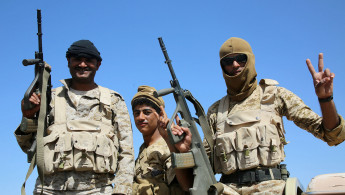Fierce fighting in northern Yemen kills over 75
The clashes in Hajjah Province near the Saudi border between rebel-allied units and pro-government Yemeni forces have killed more than 75 over the past three days, Yemeni security officials and witnesses said.
The dead included more than 40 rebels and 35 government troops, with 50 wounded on the rebel side and dozens wounded on the government side.
Most were killed by airstrikes from the Saudi-led coalition that dominates the skies in Yemen, said the witnesses and security officials, who remain neutral in the conflict that has splintered Yemen, the Arab world's poorest country.
Dozens of tanks and armored vehicles were destroyed.
The government troops advanced across the border from Saudi territory after training there for months, the officials said, speaking on condition of anonymity as they were not authorised to brief reporters.
Yemen's fighting pits the internationally recognised government backed by a Saudi-led, US supported coalition against the rebels, known as Houthis, who are allied with a former president and backed by Iran.
Local affiliates of al-Qaeda and the Islamic State group have exploited the chaos to grab land and exercise influence.
According to UN figures, the war in Yemen has killed at least 5,884 people since March, when fighting escalated after the Saudi-led coalition began launching airstrikes targeting the rebels.
Prisoner release
The fighting comes as participants at Yemen peace talks in Switzerland say rebels have agreed to release five high-profile prisoners, including the president's brother and the defence minister, as a gesture of goodwill.
They say Defence Minister, Mahmoud Subaihi, and General Nasser Mansour Hadi, brother of President Abed Rabbo Mansour Hadi, will be handed over to the Red Cross with the other three prisoners later on Saturday.
The participants, one from the Houthi rebel delegation and the other from Yemen's internationally recognised government, spoke anonymously as they were not authorised to brief reporters.
 |
|
Negotiators taking part in Yemen peace talks in Switzerland also agreed on Saturday to create a "neutral" committee to monitor the country's fragile ceasefire after new clashes left it in tatters.
"There is an understanding over forming a neutral military committee tasked with monitoring the ceasefire," a source close to the government delegation said.
The development came after the ceasefire, which took effect on Tuesday and was supposed to last a week, all but collapsed Friday as government forces seized two towns from rebels and their Saudi-led Arab coalition allies accused the insurgents of escalating the conflict by firing ballistic missiles.
UN special envoy for Yemen Ismail Ould Cheikh Ahmed had on Friday voiced alarm at the widespread ceasefire violations.
His office said the negotiating parties in Switzerland had created "a coordination and de-escalation committee ... to strengthen adherence to the cessation of hostilities."
The negotiators met at a hotel in the northwestern Swiss city of Biel for a fifth day of talks Saturday as they scramble to end the spiralling conflict.
Little progress
But sources close to both delegations said on Saturday afternoon that the talks had ended for the day with little progress.
A source close to the delegation representing President Abedrabbo Mansour Hadi's government said there had been no agreement on the general framework for the talks and no agreement on the opening of humanitarian corridors.
On Thursday, the UN had said that the two sides had agreed to "a full and immediate resumption of humanitarian assistance" in the flashpoint city of Taez in what the UN envoy had called "a major step forward".
But a local relief group, the Humanitarian Relief Coalition, said no UN aid had reached the city, accusing rebels of blocking aid delivery to areas where Hadi loyalists were holed up.
In a letter submitted by the government delegation to the talks Saturday a lawyer in Taiz accused the rebels of confiscating aid sent by the UN World Food Programme.
In another move that had been seen as promising, the pro-government forces and rebels completed an exchange of hundreds of prisoners in the southern province of Lahj on Thursday.
But the government delegation source told AFP the sides on Saturday had failed to agree any further such moves.
Government forces trained in nearby Saudi Arabia crossed the border from the kingdom Thursday and seized Haradh.





 Follow the Middle East's top stories in English at The New Arab on Google News
Follow the Middle East's top stories in English at The New Arab on Google News
![The UAE is widely suspected of arming the RSF militia [Getty]](/sites/default/files/styles/image_330x185/public/2024-11/GettyImages-472529908.jpg?h=69f2b9d0&itok=Yauw3YTG)
![Netanyahu furiously denounced the ICC [Getty]](/sites/default/files/styles/image_330x185/public/2024-11/GettyImages-2169352575.jpg?h=199d8c1f&itok=-vRiruf5)
![Both Hamas and the Palestinian Authority welcomed the ICC arrest warrants [Getty]](/sites/default/files/styles/image_330x185/public/2024-11/GettyImages-2178351173.jpg?h=199d8c1f&itok=TV858iVg)